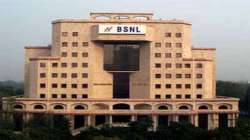BSNL likely to stay out of 5G trials
The immediate burden from VRS on the government could be in the tune of Rs one lakh crore, officials have pointed out, adding that bidding for the 5G spectrum would be financially unviable

The state-run Bharat Sanchar Nigam Limited (BSNL) is unlikely to participate in the process for allocation of 5G technology, senior officials have revealed to India TV News. Officials say that the BSNL management is at the moment more concerned about sorting out the voluntary retirement of its staff members than buying 5G spectrum from the government.
The immediate burden from VRS on the government could be in the tune of Rs one lakh crore, officials have pointed out, adding that bidding for the 5G spectrum would be financially unviable in such a scenario.
The Department of Telecommunications (DoT) announced on January 1 that telecom operators had 10 days from then to submit their bid for the 5G trials. The DoT is set to allocate spectrum for the trials in March or April, with a fixed date yet to be announced. Once the spectrum is allocated, the trial run for all the telecom operators would last for six months.
Significantly, BSNL had earlier last year entered into strategic alliances with a number of companies, namely CISCO, Ciena, Soft Bank, NTT and Nokia, to jointly roll-out 5G services in the country.
Ciena, the Maryland-headquartered company with which the BSNL had entered a Memorandum of Understanding (MoU) in February last year, declined to confirm to India TV News' email if it was looking forward to participating in the 5G trials. "We are unable to provide a comment due to ongoing holidays," said the company.
VRS may bring down losses, but revenue could suffer too
The voluntary retirement scheme (VRS), part of the government’s revival plan, is aimed towards bringing the company back in the black by retiring workers who are more than 50 years in age. More than 78,000 staff members of BSNL opted for voluntary retirement last month, constituting almost half of the total 1.59 lakh employees.
The company’s employees’ costs stood at Rs 14,492 crore in 2018-19, which the company’s chairman Pravin Kumar Purwar says will be reduced by almost 50 per cent after the VRS has been opted by the employees.
BSNL’s losses in 2018-19 stood at Rs 14,903 crore in 2018-19, almost double the losses incurred the previous year, Union Minister of Communications, Electronics and Information Technology Ravi Shankar Prasad had stated in Parliament last month. Prasad had further rubbished rumours that the government was considering disinvesting BSNL.
The minister also revealed in his written reply that the revenue of BSNL in 2017-18, as per the latest calculations, stood at Rs 25,071 crore, compared to Rs 31,533 crore the previous year.
“No government will disinvest a Public Sector Undertaking like the BSNL or MTNL, but what option would they have if the situation becomes financially unsustainable,” say officials.
“Their losses might come down due to massive retirement, but their revenue too will suffer. The percentage loss will likely remain the same,” they point out.
Employee unions of BSNL have accused the government of treating the telecom operator unfairly, claiming that not awarding them with a 4G licence had affected the competitiveness vis-à-vis private players.